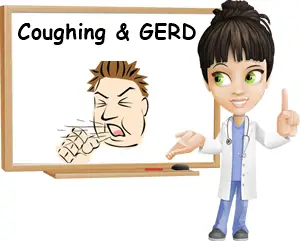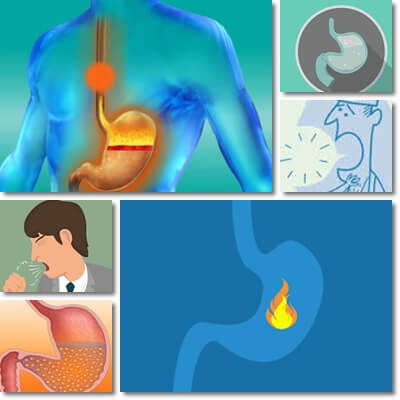Coughing is a symptom we don’t normally associate with acid reflux, but with a respiratory infection, allergies or asthma. And yet it’s one of the most telling signs of gastroesophageal reflux disease, or GERD. Coughing in the morning after waking up is a clear symptom of acid reflux disease. It may or may not be accompanied by additional symptoms such as nausea or vomiting or heartburn, but it alone is a strong indicator that you have stomach acidity and that it needs to be dealt with sooner than later.
What is acid reflux disease?
Formally known as gastroesophageal reflux disease or GERD for short, acid reflux is a medical condition in which gastric juices or stomach acid escape from the stomach and rise up into the esophagus. Sometimes, they make their way up high, into the mouth, causing a bad taste in the mouth, usually a metallic, acidic or bitter taste. Acid reflux disease can be silent and not produce any symptoms. But, for the most part, it’s symptomatic and you know when you have it. It’s just a matter of recognizing the symptoms.

The most telling signs and symptoms you have acid reflux are regular and persistent heartburn, bad taste in the mouth, coughing that is most likely to occur early in the morning when you wake up or in the evening or at night when you lie down to sleep, possibly also nausea and vomiting in the morning when you wake up, dry or sore throat, hoarseness and wheezing unrelated to a respiratory infection. Coughing from acid reflux is different from coughing from pollen allergies or a cold or another respiratory infection. Compared to allergies or respiratory infections, acid reflux does not trigger excess mucus production, does not cause white, yellow or green mucus, fever or aches and pains all over the body.
Coughing with phlegm: acid reflux or infection?
Coughing with phlegm indicates increased mucus production which occurs when the immune system activates itself to fight off germs, allergens or irritants. When considered alone, without other symptoms, coughing with phlegm can be caused by a respiratory infection such as the common cold, the flu, sinusitis etc. or it can be a sign of allergies, asthma or exposure to irritant substances, but not usually acid reflux. Acid reflux cough is a different kind of cough, usually dry in nature (or at least not very productive), and is brought on by gastric juices escaping the stomach and making their way up into the esophagus (or as high as the mouth). The rise in gastric juices irritates the esophagus lining, causing a tingling sensation that promotes coughing as a reflex.
Coughing with phlegm from a cold, the flu or another respiratory infection may start out with abundant, clear or white mucus, but as the infection progresses, the mucus changes color. Typically, mucus color in a cold or another respiratory infection gradually turns yellow and then green, depending on the nature and severity of the infection. By comparison, mucus color is white or clear and stays that way if it’s allergies or exposure to irritants.

Is it acid reflux, allergies or a cold?
Coughing with acid reflux. The following signs and symptoms are indications you have acid reflux:
1) Coughing occurring in the morning after waking up or before eating breakfast. May be accompanied by nausea or vomiting which can also be symptoms of an ulcer.
2) Coughing occurring before bed, after eating dinner, especially if you don’t stand or sit in an upright position to allow gravity to help digestion.
3) Coughing at night when lying down in bed to sleep. Also waking up from your sleep coughing.
4) Coughing after eating at any time during the day or before eating, if the stomach is really empty.
5) Coughing while eating from acid reflux occurs if you eat too much during the meal, have too many liquids with the meal or eat foods that are bad for acidity.
6) Coughing after exercising such as running or weight training or after lifting things. More likely to occur if your stomach is really empty or soon after eating, especially if it’s a larger meal.
The more frequent and worse the cough, the more severe the acid reflux and the stronger the recommendation to have it treated. Also, in my experience, the cough if usually on the drier side (there’s little to no mucus production). See other signs and symptoms of acid reflux.
Coughing from allergies. Depending on your type of allergies, the cough may occur seasonally such as in the case of seasonal allergies or hay fever or occasionally, when coming into contact with a specific allergen. You can tell it apart from GERD coughing by the following signs and symptoms:
1) The cough is always productive. The immune system activates in the presence of the allergens and reacts by increasing production of mucus from mucous membranes (nose, throat) in order to trap the foreign agents (allergens) and remove them.
2) With allergies, there’s coughing with phlegm and there’s also sneezing, itchy, red watery eyes, itchy ears and throat, tingling sensation in the throat and your nose is runny except when it’s congested (which happens if you don’t drink enough water to thin the mucus).
Coughing from a respiratory infection. Whether it’s a cold, the flu, a sinusitis, bronchitis, pneumonia or any kind of respiratory infection, you should notice at least a few of the following symptoms which do not occur with acid reflux (aside from the cough):
1) Fever: typical sign of an infection. Does not occur with GERD or allergies either.
2) Chills alternating with fever: common in most infections that present with fever.
3) Aches and pains: coughing and an achy body is a combination that frequently occurs with the flu, but can be seen in a less severe form with the common cold or in more severe infections.
4) Productive cough with changes in mucus color. A respiratory infection will have you coughing up yellow or even green phlegm. Changes in mucus color mean the infection is progressing. Yellow nose and throat mucus contains cell debris, white blood cells and germs the immune system has dealt with.
5) Headaches and sinus pain, tenderness or pressure in the face indicate a sinus infection.
6) Chest discomfort indicates a lower respiratory tract infection.
7) A sore throat, red and inflamed, with white spots or patches is a sign of an infection.
What you can do about it
1) Treat your acid reflux. Your doctor may prescribe you either proton-pump inhibitors (PPI) such as omeprazole, esomeprazole, lansoprazole, pantoprazole etc. Depending on the severity of your condition, your doctor may recommend a 10-day to 2-weeks treatment course, sometimes more. Antacids can help make the transition from PPI treatment to GERD management without medication and are typically for managing the occasional acid reflux episode. For me, a tablespoon of Aloe Vera gel on an empty stomach in the morning, followed by a teaspoon of Manuka honey to counteract the bitterness helped make the transition easier and furthered healing.
2) Make drastic changes to your diet. Acid reflux is one of those conditions you can treat/reverse if you learn to eat so that you avoid stomach acidity. Learn to avoid problematic foods and beverages such as fried and excessively fatty foods, processed foods, onions, garlic, turmeric, ginger, chili peppers or spicy mustard, cabbage, pickles, cold meats, citrus fruits and their juices, vinegar, alcohol, chocolate, coffee or even green and black teas (the caffeine in the teas is irritating for the stomach). Of course, not everyone has the same reaction to the same foods, so what might be bad for some isn’t necessarily bad for everyone. See my personal list of foods to eat and to avoid for acid reflux – tried and tested to help you get rid of GERD cough.
3) Make lifestyle changes. In addition to eating right and following the course of treatment recommended by your doctor, lifestyle changes are vital for acid reflux management. In my experience, it helps to walk for 30 minutes to an hour after eating or even just sit upright. Gravity helps push food down and simply not lying down prevents acidity. I also don’t eat too close to bed time – I have my dinner about 3 hours before bed so digestion can complete before I lie down to sleep. Eating small amounts more often rather than a couple of large meals is good for you if you have GERD and so is avoiding lifting heavy objects for at least 1 hour after eating.
